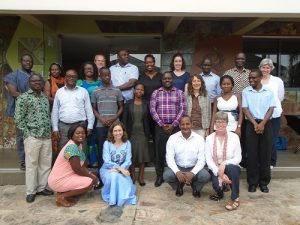Fiona Nunan is a Senior Lecturer in Environment and Development and the Director of the International Development Department. Her interests and experience focus on natural resource governance and management in developing country settings, particularly within inland fisheries and coastal locations in East and Southern Africa, and on exploring the links between poverty and the environment.
Dr Fiona Nunan reports from a workshop in Ghana, where ESPA researchers and development practitioners looked for some answers to this hot topic.
The way decisions are made about natural resources and how they are managed – their governance – matters for the health of ecosystems and how ecosystem services contribute to poverty alleviation. This month in Accra, Ghana, the ESPA-funded ‘Governance for Ecosystem Services and Poverty Alleviation’ (GESPA) project brought together researchers and development practitioners to pinpoint what we’ve learned about different governance approaches and how these approaches affect outcomes for people and the environment.
The workshop focused on sifting through and synthesising the key results and lessons from ESPA-funded projects. It was part of a one-year initiative to compare findings from ESPA research with wider academic literature. The workshop offered a key opportunity to test the headline messages from this study.

We convened government officers, researchers and representatives of international organisations from across Africa and with interests in a range of natural resources, including water, fisheries, forests and protected areas. Presenters and participants debated these headline messages:
What do we know about governance for ecosystem services and poverty alleviation?
The initial research findings and enthusiastic participation at the workshop confirmed that:
• In a review of both ESPA research and the broader literature linking ecosystem services with poverty alleviation, it was found that governance was rarely defined at the outset, was sometimes difficult to define due to different views between disciplines and is not a term that is widely used in such publications or in practice. At the workshop, it was suggested that ‘governance is taken for granted’; it is often seen as part of the research context, but not focused on. This may partly be due to research and practice being concerned with parts of governance, e.g. community-based structures or certain decisions, rather than the whole system and process.
• The exercise of power influences how governance operates and its outcomes. Power can be found in many forms, can come with a particular mandate or position, or may be found ‘behind the scenes’, where wealth and status influence decision-makers.
• Ensuring effective and meaningful participation of resource users in governance systems remains a significant challenge for many reasons. Too often, interventions are too top-down, there is not enough time given to informed and consistent engagement and resource users themselves may not have the time and incentives to participate.
• Demonstrations, pilot projects and exchange visits are all excellent ways of exposing people to how things could change and work effectively, going beyond the classroom and workshops to see things happening in practice and learning from people who have been involved.
So far, the ‘Governance for Ecosystem Services and Poverty Alleviation’ research team has reviewed seven ESPA projects in detail.
Examples of relevant findings include:
CESEA: Coastal Ecosystem Services in East Africa
Focus: governance structures, systems, practices and beliefs
Findings include:
• Implementation of participatory forest management is partial.
• Natural resource sectors work as silos at all levels.
• Opportunities as well as challenges exist for coordination between sectors.
DELTAS: Assessing health, livelihoods, ecosystem services and poverty alleviation in populous deltas
Focus: review of legislation, policy and plans to feed into delta system modelling
Findings include:
• Governance takes place through force and influence rather than through law.
• There is a lack of participation of the poor in governance systems.
• Limited coordination between ministries is problematic for integrated management.
Focus: the political ecology of governance systems, rules and outcomes
Findings include:
• WMAs maintain centralised rather than decentralised control.
• No downward accountability to community members.
• No evidence that WMAs are contributing to poverty alleviation.

What are some of the challenges for governance research and practice?
During the workshop, many challenges were identified for governance research and practice. These include:
• There has been a lack of attention to politics in research, yet lack of political will, adverse political interference and prioritising voter support consistently derails natural resource governance.
• There is consistently a lack of coordination between government departments working on different natural resources and those concerned with development. This ‘silo-isation’ is also found in literature – there is limited literature that looks at more than one natural resource or ecosystem.
• There are many gaps in knowledge and practice, including in relation to how culture affects governance, how governance can support efforts to deliver on gender equality and how coordination between sectors can be encouraged.
In the coming months, the research team will continue analysing ESPA research, setting that within the context of wider literature, and looks forward to presenting their research at the ESPA Science Conference in November.
Fiona Nunan, University of Birmingham, is leading a one year project to synthesise knowledge on governance for ecosystem health and poverty alleviation, working with Mary Menton, also of the University of Birmingham, Kate Schreckenberg, University of Southampton, Connie McDermott, University of Oxford, Mark Huxham, Edinburgh Napier University, and Rebecca Asare, Nature Conservation Research Centre, Ghana.
This post first appeared on http://www.espa.ac.uk/. read the original post here.
